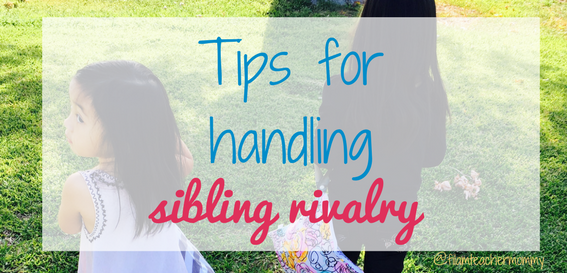Handling Sibling Rivalry
It is natural to have a love-hate relationship between siblings. The proportion of love to hate can vary depending on the overall relationship between the siblings and the kind of day they are having. Some days my kids are getting along like the best of friends, and other days, they are arguing or crying, pointing fingers at one another for a good chunk of the day. It is so easy to get sucked up into their drama, and it can take a toll on a parents’ sanity trying to play referee. Handling sibling rivalry is a challenge, but here are tips to help alleviate the conflict:’
Avoid jumping in immediately
Unless there is an urgent matter where someone will get severely hurt, give some time for the siblings to work out their issues. As tempting as it can be to fix everything, doing so will not give them an opportunity to learn conflict resolution. Staying out of the way can also prevent immediate tattling, and attention seeking to get a sibling in trouble.
Help remediate when things escalate
There are certain times when the conflict is escalating, and the children’s arguments are getting worse. It may be time to step in and help them resolve their issues. It may be that they need to cool down, or review taking turns. When stepping in to help, it is vital to stay as calm as possible, and not jump in ready to take sides. I once heard somewhere, “Don’t let their drama become your drama.” As I’m trying hard to take deep breaths, I am mentally reciting this in my head. It can be tricky when one particular child is infamous for certain types of behavior. But it is important not to pre-judge, or go off of one child’s account of what happened. The main goal is conflict resolution, not accusation.
On that same note, because it can sometimes be easy to blame one child and not the other, it is essential not to “label” your children outwardly. By labelling a child as a “responsible” one, or a “troublemaker,” it instills this expectation on the child, and can actually cause a competition. Although some relationships can be stronger in certain ways, we need to be sure that there are no feelings of “he/she is better than me.”
Conflict-resolution sessions
In the heat of the squabble, it is sometimes difficult to have teachable moments. While it is good to go over solutions during the argument, it is also beneficial to have discussions or role-playing sessions outside of the conflict, to talk about the scenario more calmly. As a family, you can reflect on what happened during the sibling argument, and possible solutions for next time. I’m not saying that by doing so, there will not be any more arguments, and that future problems will not arise, or they will be perfectly scripted as during the practice. But it does give an opportunity to discuss feelings, and alternatives to think about. When upset, it is natural to let our emotions get away from us. We want to be able to openly talk about what we are thinking and work together to resolve the issues. When the emotions take over, then we can teach the kids to take the time to cool down first. We brainstorm ways to cool off prior to re-grouping, such as breathing techniques, letting our feelings out by drawing or writing them down, or squeezing a safe toy or pillow.
No-solution leads to all-in-it-together
There are times when even brainstorming together can lead you nowhere. For example, the arguments are continuing, and no one can come up with a way or would like to take turns or share. In those cases, then the parent can just settle the matter by saying something like, “Either take turns, or I will put the toy away.” All will be doled out the same consequence, instead of placing judgment and giving it to one sibling who you think should “deserve” it.
Quality time
Every person has an innate need for positive attention. When people do not get enough sometimes it can lead to the child causing trouble, subconsciously, just to get some form of attention, even if it is negative. That is why it is crucial to provide quality time with each child every day. Quality time needs to be one-on-one time to develop the relationship. In doing so, it strengthens your bond, and it is a time when there won’t be any fighting for attention. Don’t know how to squeeze in time? The suggested amount by Positive Parenting Solutions is at least 10-20 minutes per day. When tensions run high, I do notice that when we take time to have fun bonding time, it helps alleviate our stresses.
Sibling rivalry is something that parents face regularly, so hopefully these tips can help avoid or lessen the impact. For more tips, check out Positive Parenting Solutions. I learned a lot of positive strategies there on other various aspects of parenting.
What tips do you have on handling sibling rivalry? Feel free to comment and share your tips below


